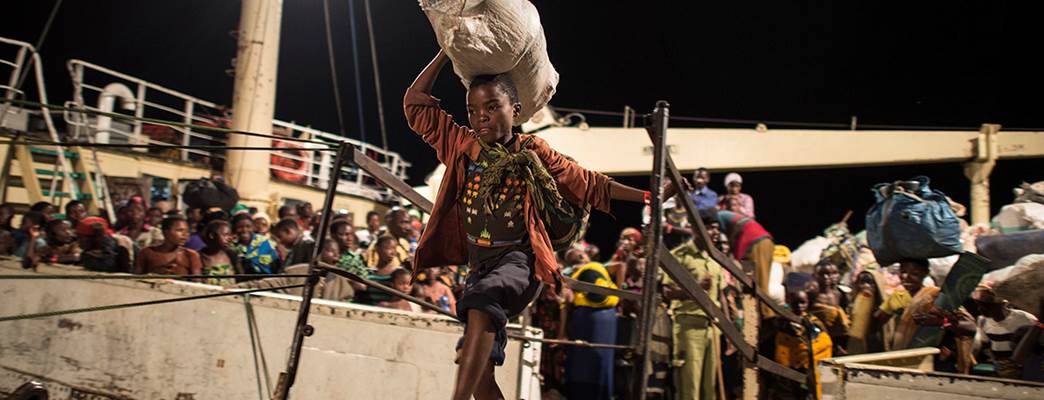The number of refugees, asylum-seekers and internally displaced persons (IDPs) has reached historic levels, and according to UNHCR, in 2015, children constituted more than half of the total refugee population,2 with the number of unaccompanied and separated children on the move also growing dramatically. More than 98,000 asylum claims were registered by unaccompanied and separated children last year (2015).
Several recent events and initiatives have highlighted the problem of large-scale movements of refugees and other displaced persons, including the World Humanitarian Summit; the global refugee youth consultations; UNHCR’s annual consultations with non-governmental organizations; events organized on the protection of children on the move on the margins of the Human Rights Council; the UN General Assembly summit on addressing large movements of refugees and migrants in September 2016; as well as in the 2030 Sustainable Development Goals, adopted by the General Assembly in September 2015.
The UN High Commissioner for Refugees will use the annual Protection Dialogue to complement discussions on this theme, aiming to provide a forum this year for a detailed analysis of the specific protection risks children face when they are on the move and promote concrete protection outcomes.
Norway’s Statement
Ambassador Hans Brattskar, Permanent Representative of Norway thanked the High Commissioner and UNHCR for the timely choice of topic for this year’s protection dialogue, a topic of great importance for Norway. Below are excerpts from Norway’s statement, prepared for the Plenary Session of the 2016 Dialogue:
“Norway would like to emphasize our appreciation for the UN high level meeting on 19 September this year. We urge all states to follow up on the New York declaration in general, and on the topics relating to children in particular.
Norway supports a principled approach to the topic of children on the move, an approach based on human rights, and where the interest of the child is a primary consideration. Protection of displaced children must be central in the Comprehensive Refugee Response Framework and the following Global Compact on Refugees.
Our approach should be holistic, not only looking at how children are treated on the move or upon arrival in destination countries, but also on why they are moving in the first place, either alone or with their family. Conflict resolution, poverty reduction and job creation are key in this respect. Education is also of great importance. Solutions in most cases, must be found at home.
We also need to bear in mind that a minor would not necessarily meet the criteria for being a refugee according to the 1951 Convention based on the mere fact that he or she is a minor. It is therefore also necessary to have well-functioning systems for return of minors who do not meet these criteria or other criteria for permissions to stay. It may also be in the best interest of unaccompanied minors to return and reunite with family, rather than being alone in a new country.
I would like to take the opportunity to emphasize the importance of education. As UNHCR has mentioned in the background papers for this meeting, missing out on education is something refugee children refer to as a great concern. We recall our common commitment in the New York Declaration from 19 September to provide quality primary and secondary education in safe learning environments for all refugee children within a few months of the initial displacement.
Only 50% of refugee children have access to primary education, compared to a global average of 90%. The gap increases as children get older. In crisis-affected countries 37 million children and young people are out of school. Norway emphasizes the need for increased support to education in emergencies and protracted crises.
More than 8% of Norway’s humanitarian budget is earmarked for education, and more than 20% of our humanitarian assistance to the Syria situation goes to education. We are pleased to continue to provide support for UNHCR and its partners in this field. We helped initiating the Education Cannot Wait fund, and encourage donors to join the fund in order to efficiently address the challenge.
Norway also promotes enhanced protection of education in armed conflict through the Safe Schools Declaration that has so far been endorsed by 56 countries. We encourage all countries to endorse and implement the declaration in order to address the urgent issue of military use of and armed attacks on schools. Access to education can be an important protection tool for children in crisis situations and children on the move by providing a degree of safety and normalcy, in addition to greatly increasing young people’s possibilities and opportunities for the future, and their ability to contribute to their communities.”
To read more about the UNHCR 2016 Protection Dialogue: http://www.unhcr.org/high-commissioners-dialogue-on-protection-challenges-2016.html
Sources: UNHCR
